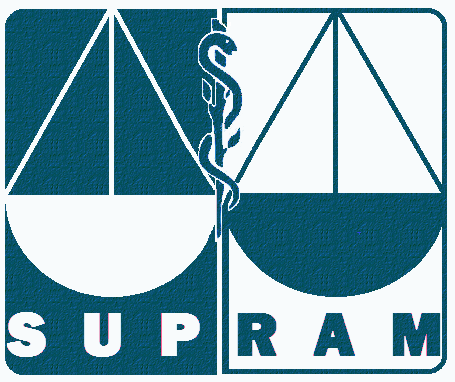– „Prava pacijenata u sistemu zdravstvene zaštite: Vodič za pravnike.“ je projekat koji se realizuje u periodu decembar 2013 – decembar 2014 uz finansijsku podršku Fondacije za otvoreno društvo. Nosilac projekta je Medicinski fakultet Univerzitet u Beogradu u saradnji sa Udruženjem pravnika za medicinsko i zdravstveno pravo Srbije – SUPRAM. Cilj projekta je razvoj Vodiča za pravnike Srbije, zasnovanog na primerima vodiča izrađenih po jedinstvenoj metodologija OSI programa u drugim zemljama. Osnovna namena Vodiča je da podrži pravnike u preuzimanju slučaja i zastupanju prava pacijenata u sistemu zdravstvene zaštite, kao i prava zdravstvenih radnika.
– “Aktuelna pitanja Medicinskog i Zdravstvenog prava” je projekat čiju je realizaciju Udruženje za Medicinsko i Zdravstveno pravo Srbije započelo 2013 godine u okviru svog programskog opredeljenja za redovno održavanje stručnih predavanja na najaktuelnije teme u oblasti u Srbiji i uporednom pravu. Tokom 2013 godine održana je serija predavanja:
- dr Hajrija Mujović Zornić, naučna savetnica Instituta društvenih nauka i potpredsednica SUPRAM-a i dr Marta Sjeničić, naučna saradnica Instituta društvenih nauka i predsednica SUPRAM-a, „Medicinsko i zdravstveno pravo: aktuelna pitanja teorije i prakse“, april 2013.
- Prof. dr Jakov Radišić, „Pravna kvalifikacija medicinski neindikovanog hirurškog zahvata obavljenog na insistiranje pacijenta“, maj 2013.
- Prof. dr Zorica Mršević, naučna savetnica Instituta društvenih nauka i Milan M. Marković, istraživač saradnik Instituta društvenih nauka i generalni sekretar SUPRAM-a, “Pravni i društveni aspekti prilagođavanja/promene pola u Srbiji: zdravstvena prava i status transseksualnih osoba”, jun 2013.
- Dragana Marčetić, sudija Prvog osnovnog suda u Beogradu i Jasmina Selaković-Papić, advokat, “Pitanja dokazivanja u sporovima zbog greške u medicini i sudsko-medicinsko veštačenje”, oktobar 2013.
- Dragana Ćirić Milovanović, izvršna direktorka Inicijative za prava osoba sa mentalnim invaliditetom (MDRI-S) i Milan M. Marković, generalni sekretar Suprama, istraživač Instituta društvenih nauka i MDRI-S „Zdravstvena prava i pristup zaštiti osoba sa invaliditetom u rezidencijalnim ustanovama“, novembar 2013.
- Dr Marta Sjeničić, naučna saradnica Instituta društvenih nauka i predsednica SUPRAM-a, „Medicinskopravni aspekti trudnoće kod HIV pozitivnih žena“, novembar 2013.
- Prof. dr Jakov Radišić – „Odgovornost zbog lekarske greške u obliku nečinjenja“, decembar 2013.
– „Ljudska prava i vrednosti u biomedicini– Demokratizacija odlučivanja u zdravstvu i implementacija“ je projekat koji nosi Institut društvenih nauka, Centar za pravna istraživanja, a koga u najvećoj meri realizuju istraživači članovi SUPRAM-a. Predmet projekta je odnos ljudskih prava i biomedicine gledano sa aspekta relevantnih međunarodnih standarda i potrebe njihovog unošenja u interni pravni poredak Republike Srbije.
– Implementacija projekta: “Roma Health Project – Public Health Program”. Projekat finansira Open Society Foundation, a njegov glavni izvođač je Centar za prava manjina. U implementaciji projekta kroz kontinuiranu edukaciju u Beogradu, Nišu i Novom Sadu, na temu “Kvalitet zdravstvene zaštite romske populacije u Srbiji”, učestvuje i Udruženje pravnika za medicinsko i zdravstveno pravo Srbije-SUPRAM. Predmet kontinuirane edukacije su: 1.Pravo na najviši mogući standard zdravstvene zaštite i položaj Roma, 2. Pristup zdravstvenoj zaštiti i načelo nediskriminacije, 3. Zaštita prava pacijenata sa posebnim osvrtom na pripadnike Roma i 4. Zdravstvena zaštita vulnerabilnih grupa – implementacija i monitoring sprovođenja zdravstvene politike.
– “Pravo Roma na kvalitetnu zdravstvenu zaštitu (Osnaživanje predstavnika Roma u lokalnim samoupravama u postizanjuu prava Roma na kvalitetnu zdravstvenu zaštitu)” – SUPRAM, u toku 2014., sprovodi projekat zajedno sa Centrom za prava manjina. Projekat finansira Fondacija za otvoreno društvo. Cilj projekta je ojačanvanje aktivne i efikasne uloge predstavnika Roma u Srbiji u pristupu osnovnim ljudskim pravima. Specifični ciljevi su: 1) Podizanje svesti u društvu o značaju zdravstvene i socijalne zaštite za romsku populaciju i 2) Osnaživanje i motivisanje predstavnika Roma u lokalnim samoupravama u Srbiji da rade sa i u ime romske populacije u olakšavanju pristupa njihovim pravima u oblasti zdravstva.
